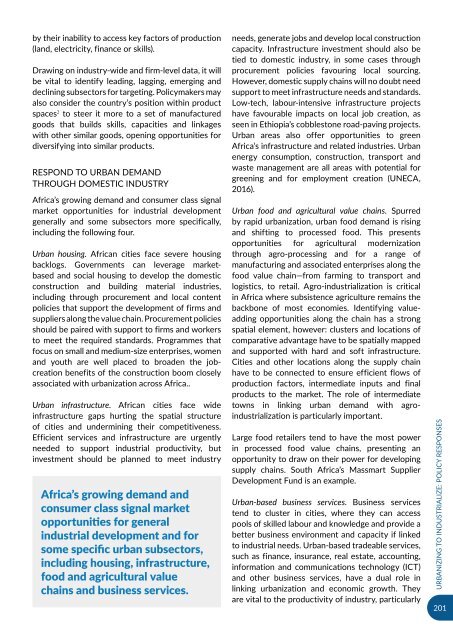URBANIZATION AND INDUSTRIALIZATION
Economic%20Report%20on%20Africa%202017%20UNECA
Economic%20Report%20on%20Africa%202017%20UNECA
Create successful ePaper yourself
Turn your PDF publications into a flip-book with our unique Google optimized e-Paper software.
y their inability to access key factors of production<br />
(land, electricity, finance or skills).<br />
Drawing on industry-wide and firm-level data, it will<br />
be vital to identify leading, lagging, emerging and<br />
declining subsectors for targeting. Policymakers may<br />
also consider the country’s position within product<br />
spaces 2 to steer it more to a set of manufactured<br />
goods that builds skills, capacities and linkages<br />
with other similar goods, opening opportunities for<br />
diversifying into similar products.<br />
RESPOND TO URBAN DEM<strong>AND</strong><br />
THROUGH DOMESTIC INDUSTRY<br />
Africa’s growing demand and consumer class signal<br />
market opportunities for industrial development<br />
generally and some subsectors more specifically,<br />
including the following four.<br />
Urban housing. African cities face severe housing<br />
backlogs. Governments can leverage marketbased<br />
and social housing to develop the domestic<br />
construction and building material industries,<br />
including through procurement and local content<br />
policies that support the development of firms and<br />
suppliers along the value chain. Procurement policies<br />
should be paired with support to firms and workers<br />
to meet the required standards. Programmes that<br />
focus on small and medium-size enterprises, women<br />
and youth are well placed to broaden the jobcreation<br />
benefits of the construction boom closely<br />
associated with urbanization across Africa..<br />
Urban infrastructure. African cities face wide<br />
infrastructure gaps hurting the spatial structure<br />
of cities and undermining their competitiveness.<br />
Efficient services and infrastructure are urgently<br />
needed to support industrial productivity, but<br />
investment should be planned to meet industry<br />
Africa’s growing demand and<br />
consumer class signal market<br />
opportunities for general<br />
industrial development and for<br />
some specific urban subsectors,<br />
including housing, infrastructure,<br />
food and agricultural value<br />
chains and business services.<br />
needs, generate jobs and develop local construction<br />
capacity. Infrastructure investment should also be<br />
tied to domestic industry, in some cases through<br />
procurement policies favouring local sourcing.<br />
However, domestic supply chains will no doubt need<br />
support to meet infrastructure needs and standards.<br />
Low-tech, labour-intensive infrastructure projects<br />
have favourable impacts on local job creation, as<br />
seen in Ethiopia’s cobblestone road-paving projects.<br />
Urban areas also offer opportunities to green<br />
Africa’s infrastructure and related industries. Urban<br />
energy consumption, construction, transport and<br />
waste management are all areas with potential for<br />
greening and for employment creation (UNECA,<br />
2016).<br />
Urban food and agricultural value chains. Spurred<br />
by rapid urbanization, urban food demand is rising<br />
and shifting to processed food. This presents<br />
opportunities for agricultural modernization<br />
through agro-processing and for a range of<br />
manufacturing and associated enterprises along the<br />
food value chain—from farming to transport and<br />
logistics, to retail. Agro-industrialization is critical<br />
in Africa where subsistence agriculture remains the<br />
backbone of most economies. Identifying valueadding<br />
opportunities along the chain has a strong<br />
spatial element, however: clusters and locations of<br />
comparative advantage have to be spatially mapped<br />
and supported with hard and soft infrastructure.<br />
Cities and other locations along the supply chain<br />
have to be connected to ensure efficient flows of<br />
production factors, intermediate inputs and final<br />
products to the market. The role of intermediate<br />
towns in linking urban demand with agroindustrialization<br />
is particularly important.<br />
Large food retailers tend to have the most power<br />
in processed food value chains, presenting an<br />
opportunity to draw on their power for developing<br />
supply chains. South Africa’s Massmart Supplier<br />
Development Fund is an example.<br />
Urban-based business services. Business services<br />
tend to cluster in cities, where they can access<br />
pools of skilled labour and knowledge and provide a<br />
better business environment and capacity if linked<br />
to industrial needs. Urban-based tradeable services,<br />
such as finance, insurance, real estate, accounting,<br />
information and communications technology (ICT)<br />
and other business services, have a dual role in<br />
linking urbanization and economic growth. They<br />
are vital to the productivity of industry, particularly<br />
URBANIZING TO INDUSTRIALIZE: POLICY RESPONSES<br />
201


